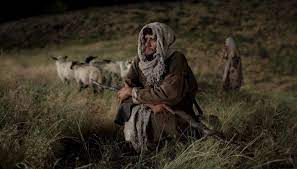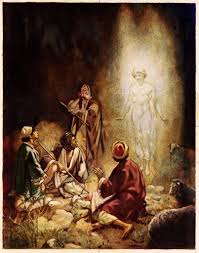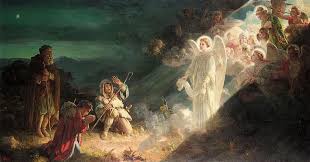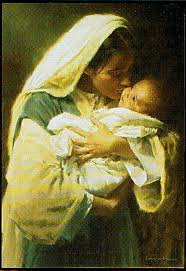
Shepherds in the Fields
On the night Jesus was born, there would have been many shepherds in many fields in and around Bethlehem. For 99.99% of them, it was just another boring night in the month of June. Except that is, for a particular band of shepherds that were selected by God to be the first to hear the news that the long awaited Messiah of Israel had at last been born. Related Paper, “The Accurate Date of the Birth of Jesus”.

Shepherds were considered the lowest caste of people. The job was performed by society’s poorest of men. Some jobs are harder than others but almost anyone could herd sheep from one pasture to another and guard them at night. They stayed keeping watch over their flocks through the night to keep the sheep from wondering off. But also to keep away poachers who would steal sheep for money, or wild dogs who would kill sheep just for the thrill of the chase. The occupation was so lowly and filthy that herders had been considered an abomination since ancient times. Even Abraham was told not to tell Pharaoh he was a sheep herder as they were considered too unclean to be in the presence of cultured Egyptians (Genesis 46:34). It would seem that the reason the shepherds were notified about the birth was exactly because they were the most despised, overworked, underpaid and mistreated people of any occupation at that time.
All Jews were afraid of angels. This is because they were taught that angels were messengers or omens of impending death. This is why all angels start off their message from God with the phrase “Do not be afraid”. But in the case of the shepherds, the angel said, “… Fear not: for, behold, I bring you good tidings of great joy, which shall be to all people” (Luke 2: 10). This particular appearance of angels at the birth of Jesus had a number of ramifications to be considered.

First, the heavens opened up and the Angel of the Lord appeared (Luke 2:9). This angel is spoken of throughout the Old Testament and many scholars see this particular Angel as a preincarnation or Christophany of Christ. For example, Abraham met with three angels on their way to destroy the city of Sodom. But one of the angels was suddenly understood by Abraham as being the Lord (Genesis 18:1-35). This idea is further backed up by the phrase, “And, lo, the Angel of the Lord came upon them, and the glory of the Lord shone round about them: and they were very afraid” (Luke 2:9). Again, it speaks of the Lord and a light that lit up the entire area around them. This can only be referring to the Shekinah light that comes only from the very presence of God. The Angel said, “I bring you good tidings of great joy, which shall be to all people.” (Luke 2:10). The word all implies that the mission of the Messiah not only included the Jews as God’s chosen people, but apparently all the people or gentiles of the world. The angel went on to say, “For unto you {Jews}, is born this day {today} in the city of David {Bethlehem}, a Savior {mission} which is Christ {Messiah} the Lord {God}. This is the only place in the Bible that these three words come together. “And this shall be a sign unto you;” Jews always needed a physical sign to confirm the validity of a supernatural event; “You shall find the babe, wrapped in swaddling clothes; lying in a manger”. This pronouncement would have boggled the mind of a lowly shepherd. This meant that the long-awaited King of Israel was born in a stable not a palace and was being kept in a livestock feeding trough for His cradle. This was a scene they well knew as shepherds but it was definitely not the scene they would expect concerning the birth of their King. Now their curiosity was really peaked.

Then suddenly, there was with the Angel of the Lord, a multitude {army in ISV Bible translation} of angels as far as the eye could see from horizon to horizon, praising God. Just imagine the highest of angels announcing the salvation of mankind to the lowest of men (Luke 2:10-14). Wow! The separation of the spiritual and physical worlds was briefly opened and these two dimensions meet for one of very few times in recorded history. It will happen again at the Second Coming of Christ (Revelation 19:11-14). The shepherds immediately went to see Jesus then left the stable spreading the word that the Messiah had been born (Luke 2:16-18). The shepherds were the perfect men to be the first to see and announce the birth of Jesus. They were humble, they immediately did what they were told to do, they evangelized to others and they felt honored to do so.
In this unique scene, we see the Heaven of God opening itself up to the world of mankind and the Angel of the Lord descends accompanied by innumerable other angels to announce the birth of the Savior of the world. Some scholars have suggested that what may be revealed here is that literally, the Spirt of the Word of God, left the Throne of God, descended down to the Earth and indwelled the sin-free newborn infant body created nine months earlier by Mary through the power of the Holy Spirit. The multitude of heavenly host or army of angels, must have served as His personal security and royal entourage escorting Him on this prophesied mission. The Word of God departed from His Throne, passed from the spirt world of Heaven and through the physical atmosphere of the Earth which is the current kingdom of Satan (Ephesians 2:2). And, just as Jesus was escorted out of Heaven by an army of angels at His first coming (Luke 2:13), so we read that He will also be escorted by this same army of angels at His second coming. Only this time it will also be accompanied by His Bride the Church saints (Revelation 19:7-8,14). Then, after the Spirit of the Word of God had safely indwelled the body of Jesus, the entourage went out to announce His birth to the shepherds before returning to Heaven mission accomplished (Luke 2:8-15)!

Some scholars further theorize that this event may also serve as a revelation that the God created spirit of a person does not enter the human body until the time that the umbilical cord is cut and the child is functioning on its own, free from the mother’s life support system. Otherwise, when a baby is miscarried or aborted, the spirit of the child would be instantly freed to return back to God without ever having experienced consciousness or life outside the mother. Thus, what purpose would have been served?
So, the shepherds were rightfully the first to see Jesus in a stable in Bethlehem. And, it was on this very same June night 900 miles to the East, that the Magi or Wiseman of Babylonia, witnessed a Star in the western sky reach its zenith or brightest point. It was then that they concurred that the King prophesied by their prophet Daniel had been born. So, they spent the next three months organizing a state sponsored trip on behalf of the King of Babylon. In the Fall of 2B.C. they began a three month pilgrimage to the land of Judah to see and worship this prophesied Messiah of the World. Daniel referred to Him as, "Anointed the Most Holy" (Daniel 9:24),“Messiah the Prince" (Daniel 9:25), and the "Messiah cut off but not for Himself" (Daniel 9: 26). This six month timeline helps explain how it was that, while the star had its zenith on June 17th, the Magi arrived six months later on December 25th. It also helps explain that by this time, the Magi found Jesus and His mother living in a house (Matthew 2:11). And last but not least, it explains why we continue to celebrate the birth of Jesus on the same date the Magi first celebrated his birth.
An oral tradition hypothesized that these particular shepherds were possibly Levitical Priests assigned to care for the sheep to be sacrificed at the Temple every morning at 9 o’clock a.m. and every evening at 3 o’clock p.m. It should be noted that Jesus was crucified at 9 o’clock a.m. and died at 3 o’clock p.m. Scripture does not state who the shepherds were, only that they tended sheep in the grazing fields around Bethlehem. It is true that the Temple’s sheep were specially bred to be completely blemish free so as to be acceptable for Temple sacrifices. And, it is true that when these sheep are born, they were wrapped in cloth to protect and keep them warm. And, it is also true that they were kept in special manmade caves and raised separate from other livestock. But, if the angels had appeared to these Levitical Priests, they would have immediately reported the incident to the Temple's Chief Priests, and we do not read of any such reports.

Instead, scripture tell us that the shepherds went to see the newborn and found Him with his mother and step father in a stable. After they saw the new born, they spread the word about their angelic visit and all that had been told to them about the child. This first small act on the part of these poor men was, none the less, the first act of evangelism. The Saviour of the world had been born and the meek and disheartened were the first to hear the news from one of their own. We read that all who heard them were amazed and probably more than a little skeptical. But, after all of this excitement, they simply went back to their flocks to continue their night watch (Luke 2:20). So, there is absolutely no mention of the event being reported to the Temple Chief Priests which would certainly have occurred if witnessed by any Levitical Priest. And, it does seem much more appropriate that the good news of a Savior for all mankind regardless of status, money or power, would be first announced to the poorest of men. This was, after all, in keeping with Jesus’ ministry to the poor, meek and those seen as societies outcasts.

Scripture goes on to tell us that, “But Mary kept {stored in her memory} all these things {events}, and pondered {contemplated them}, in her heart” (Luke 2:19). And this was a good thing because, with the death of Joseph, only Mary had the detailed remembrances of all the birth events. She alone had first hand recollections concerning the engagement period, annunciation, conception and journey to Bethlehem, to the birth of Jesus, the visit of the shepherds and later the Magi, their escape from Herod into Egypt and their return to Nazareth. She must have related all these events to the Apostle Luke when he came to interview her so he could include the birth story of Jesus in his Gospel (Luke 1:1-4).
If you enjoy the information provided on this site, please consider making a donation of any amount to help continue its production. Donate Now